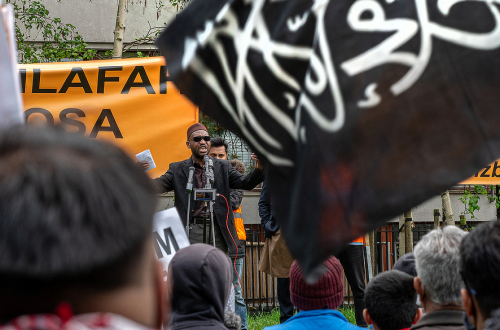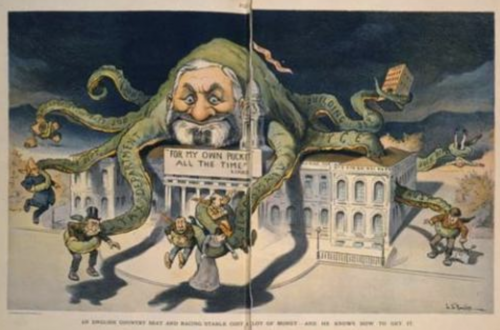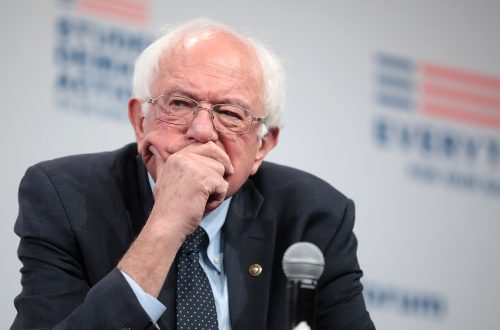Here are some perspectives on the recent Newsnight debate. Farooq Aftab, a spokesperson for Ahmadiyya Muslim youth, questioned the debate’s opening premise as well as the way it was conducted.
Rather than addressing the important question of the debate, the interview spiralled into a shouting match between three British Muslim men about whether or not a cartoon was offensive. It would have been two British Muslim men and a Muslim woman, but the program’s producer oddly felt that making the panel all-male would offer a ‘wider range of views’.
And so after much hype and nine minutes of ranting, the viewers were left none the wiser as to who actually speaks for British Muslims.
Returning to the original question, it is clear to many that no one speaks on behalf of British Muslims. A Muslim, by definition and empirically, is not a single entity. British Muslims are not robotic machines with ‘Made in the Muslim Kingdom’ stamped on their necks. They are women, men, black, white, young, old, of European, African and Asian descent, and belong to all classes and political persuasions. To ask who speaks for Muslims, therefore, would be as ludicrous as to ask who speaks for white people or Hispanic people.
The author of the debate title perhaps mistakenly thought that his question was synonymous with ‘who speaks for British Islam?’ Islam is a religion which sets out both specific and broad principles that Muslims (i.e. diverse believers in Islam) are asked to follow. Two important points are usually forgotten. First, as a matter of principle Islam places no compulsion on religious choice, and second, it provides a pluralism that allows Muslims of all backgrounds to both live as Muslims and enjoy their own personal space and freedoms.
As to who speaks for Islam, that is a far more complicated and important question. Such individuals either propagate the peaceful and pluralistic teachings of Islam in its pure form, so that they can be of benefit to the whole of humanity, or conversely bend Islam’s teachings in order to promote selfish agendas driven by a lust for power, money and hate.
Iram Ramzan, writing in Left Foot Forward, was also frustrated by the debate.
What we eventually saw was a group of South Asian Muslim men, aged 30 plus, shouting at each other (because we clearly don’t see enough of those do we?) The result was a tit-for-tat argument that descended into chaos, which even Jeremy Paxman left looking bewildered.
There is clearly no love lost between Mehdi Hasan and Maajid Nawaz, but the pair wasted an opportunity to come together to have a much needed discourse on the issue of Muslim representation.
Ironically, Myriam Cerrah complained about the all-male panel, claiming it was not representing a diverse range of views but then suggested that ex-Muslims should not be able to speak about Islam.
Far too often, Muslims complain that there is no unity within their communities yet when debates such as the one on Newsnight are aired, they take one side against the other, declare one, or all, participant(s) as non-Muslim, or non representative.
Here’s Myriam Francois-Cerrah – bizarrely bumped from the panel in favour of Mo Ansar – telling us what she would have said:
People’s antagonism towards Maajid isn’t actually about him being the alleged beacon of liberal tolerance, in an ocean of hate-filled bigotry, as he and his minions like to claim. Muslims don’t dislike Maajid because he supports gay rights or free speech. They might disagree with him on issues, but the visceral reaction he engenders has little to do with his personal outlook and everything to do with his think tank’s extremely poor engagement with the community it ought to be supporting in eradicating violent elements which, Gallup polls indicate, worry Muslims even more than they worry the broader public.
…
[I]n Monday’s film, his linking of Muslim feminists to ex-Muslims as different examples of “progressive” voices within the community has done a huge disservice to Muslim feminists who struggle as it is to be recognised as speaking from within. Now we’re being put in the same boat as those who campaign against the faith! How helpful is that to our efforts at working for gender equality within our community.
Assia Bandukda offers her perspective, suggesting that the debate didn’t tackle the most important issues for British Muslims.
The recent BBC Newsnight programme on who speaks for the British Muslims was really disappointing because of poor management of the debate as well as poor performance of the panellists. Both Maajid Nawaz and Mehdi Hassan are well known public figures and whether they like it or not, symbolise the hopes and dreams of many 2nd and 3rd generation British Muslims. I believe that as public figures they have some responsibility to their readers, followers and potential constituents. Mehdi Hassan at least drew attention to the absence of women’s voice on the panel, although the short film did have female contribution, but without the opportunity for a dynamic engagement with the panel. It seemed strange to include ex-Muslims although there is no denying the horrible prejudice and social isolation they often face on account of rejection of their former faith.
All the panel members were shouting each other down rather than giving a voice to the concerns of British Muslims or the general population. I must admit that Mehdi through his writings and commentary regularly highlights the issues faced by the average person in the street, but this was sadly lacking here. As a female British Muslim viewer I was left wondering why they had not spoken about the high levels of unemployment and disengagement of young people, the fall out of austerity measures on the weakest and the most vulnerable. The widening gap between the rich and the poor; the total decimation of traditional industries over the last 30 years with the majority of new job creation being focused around the South East at great cost to the rest of the UK. Undoubtedly some of these issues are more acutely felt within the Muslim communities but they are also prevalent among the traditional white working class communities. Over last 40 years I have witnessed the total destruction of white working class neighbourhoods due to high unemployment, educational under achievement, family break downs as well as disaffection amongst the young people and as a British Muslim it does and should concern us all.
It was also an opportunity to highlight the strengths and positive contributions of the Muslim communities in terms of entrepreneurial spirit, creating jobs, and increasing involvement at both national and local issues. Instead it was all about cartoons and self-indulgence, who had said what and who has more Muslim credentials. As if the problems of British Muslims stem from lack of Islamic faith, instead of lack of civic engagement and absence of offering viable solutions routed in strong Islamic ethos of tolerance, equality and justice regardless of belief, race, class, gender and sexuality.
It almost seems that we the British Muslims are still struggling with a sort of dichotomy or tensions between being British citizens and followers of Islam. I don’t need any Muslim to speak on my behalf but yes if a particular public figure who also happens to be a Muslim they may have a more nuanced grasp of a few socio-cultural matters. All public figures need to be judged on the basis of quality of their ideas rather than religious/ cultural beliefs. In my opinion there is no single Muslim identity, Islam’s major strength lies in being a pluralistic and inclusive faith with many schools of thoughts in its fold for centuries. I see the recent phenomenon for some Muslims to go around declaring practices of other Muslims as outside the fold of Islam began towards 2nd half of the 20th Century with pulling back of European empires and emergence of Islamic revivalist movements. Prior to this, for centuries Muslims lived under both Islamic and colonial governments in relative peace in multi faith communities. I have seen my grandparents and parents generations of being much more at ease with different rituals and practices without declaring someone to be a non-Muslim. So I practice a simple faith in which my declaration of faith i.e “the Shahadah” the belief in oneness of God and the belief in the Prophet Muhammad (pbuh) being a messenger of God is all that is required to be a Muslim.
As a person of faith I was taught that God alone is the judge. God has not given that right to any human being to judge others on their observation or lack of their religious obligations, including; diet rituals, offering prayers, charity, fasting as well as dress code (covering head or not), length of male facial hairs or how high above the ankle is a man’s trouser or whether there is a mark on my forehead from making regular (sajood) prostration. All these spheres are my personal business, and every soul is answerable to the creator for his/her deeds. Yes my faith enjoins me to counsel others towards good deeds, through good example in most humble and loving manner and only if there is an interest/ inclination. For example, to paraphrase Javed Ahmed Ghamidi (www.javedahmadghamidi.com) If, a farmer goes around randomly scattering the seeds of his crop everywhere, without first preparing and tilling the soil and without provision of good quality fertiliser and water at regular intervals and protecting his crops from disease and pest etc… he is unlikely to produce a successful harvest. So when we go around preaching our faith to the general population who are not interested then we are behaving like a careless farmer who is scattering his precious seeds, hoping to get a bumper harvest. It seems that a few of our so called religious preachers (supposedly speaking on our behalf) have hijacked our faith and presented in a vile and twisted form resulting in a very bitter harvest for our families and communities. That is why I don’t want to give any one the right to speak on my behalf, I can speak for myself, even in religious matters my holy book informs me that God has made his message clear and easy to understand and that he has given me eyes and ears, a highly functioning brain and a tongue and I am frequently beseeched to think and ponder. So it looks like speakers on behalf of British Muslims will increasingly find themselves out of a job. Hands off my faith!
And finally John Sargeant is (understandably) exasperated by Mo Ansar:
Mo Ansar did his best to say the cartoon did not really offend him but a parliamentary candidate should not do something that might recklessly or knowingly offend others. Which presumably was why he encouraged people to support a petition which said it was offensive, when he did not think it was, while claiming he did not want him deselected, which the petition he backed called for (see why for this Aaronovitch called Ansar “slippery” here).
“I will not make you a free speech martyr!” shouts Mo Ansar – but the petition called for a cost (deselection) on the basis that it is knowingly offensive to reproduce an image of the prophet. A denial of free speech because it is offensive. Mo having his cake and eating it. When Mo mentioned the election and claimed that Nawaz was defining Islam as a gatekeeper, I nearly fell off my chair. Because a back door blasphemy code of conduct on Muslim parliamentary candidates is exactly that.


